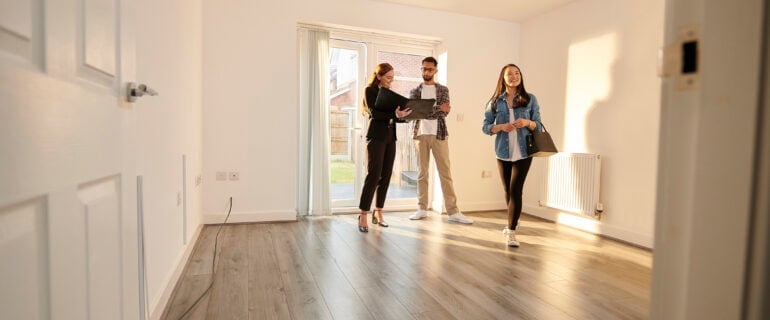By mid-2023, future Canadian home buyers should have a new savings and investment tool at their disposal to help them prepare for an initial run at the market: the First Home Savings Account.
Combining aspects of tax-free savings accounts (TFSAs) and registered retirement savings plans (RRSPs), the First Home Savings Account could help some buyers purchase their first house, but it will require serious savings discipline and a whole lot of cooperation from the housing market.
Let’s find out more about the FHSA, and then dig into its pluses and minuses.
Who’s eligible for the First Home Savings Account?
To open a First Home Savings Account, you must:
- Be a resident of Canada.
- Be at least 18 years old.
- Be a first-time home buyer.
According to the federal government, you’re a first-time home buyer if you:
- Have not owned a home in which you lived at any time in the calendar year before opening your FHSA.
- Have not owned a home in which you lived at any time in the preceding four calendar years.
If you own property through beneficial ownership, like a corporation, you won’t be eligible for the program.
How will the First Home Savings Account work?
If you’re eligible, you’ll be able to set up a First Home Savings Account at any financial institution that offers TFSAs and RRSPs: banks, credit unions, life insurance companies and Canadian trust companies. An FHSA be easy to open, it should also be fairly straightforward to use.
You can deposit funds into your First Home Savings Account up to an annual contribution limit of $8,000, and a lifetime contribution limit of $40,000. Those contributions are tax-deductible, which is one of the FHSA’s more interesting benefits.
The money in your FHSA can be used to purchase various investment products, like mutual funds, stocks, bonds and guaranteed investment certificates. You won’t have to pay taxes on any of the gains these investments generate — another nice perk.
When the time comes to purchase your first home, you’ll submit a request to your FHSA issuer that confirms your eligibility to make a qualifying withdrawal. If all’s well, you’ll receive your savings and put the full amount toward your down payment, deposit or closing costs tax-free.
Qualifying and non-qualifying FHSA withdrawals — and taxes
Because the First Home Savings Account is designed to help home buyers, only withdrawals put toward a home purchase will qualify and receive tax-free treatment.
To make a qualifying withdrawal, you must:
- Be a first-time buyer.
- Reside in Canada at the time of your withdrawal.
- Have a written agreement to buy or build a home in Canada before October 1 in the year that follows the year of withdrawal. If you plan withdraw your FHSA funds on December 1, 2023, for example, you’ll have to have such an agreement in place by October 1, 2024.
- Intend to use the home as your principal residence within one year of buying or building it.
If your withdrawal doesn’t meet these conditions it will be considered non-qualifying.
Non-qualifying FHSA withdrawals will be added to your taxable income for the year, which could lead to an outsized tax bill. Your FHSA provider will also collect a withholding tax on non-qualifying withdrawals that’s “consistent with the treatment applicable to taxable RRSP withdrawals,” and those penalties can be steep [1].
You can, however, transfer money from a First Home Savings Account to an RRSP or registered retirement income fund on a tax-free basis. These transfers won’t reset your lifetime FHSA contribution limit, but they also don’t reduce your RRSP contribution room.
Other FHSA contribution rules
We’ve established that you have annual and lifetime FHSA contribution limits of $8,000 and $40,000, respectively. But there are a few other rules to keep in mind.
Unlike with RRSPs, your annual FHSA contribution limit applies to a calendar year, and doesn’t include the first 60 days of the following year. After December 31, the contribution time for any particular year is up.
If you don’t hit your annual FHSA contribution limit, the leftover amount carries over to the next year. If you contribute $4,000 in 2023, for example, you’ll have $12,000 worth of contribution room to work with in 2024.
You can hold more than one FHSA, but you have to adhere to a single annual and lifetime contribution limit. If you go over your annual contribution limit, you’ll be taxed at a rate of 1% per month on the excess contribution amount. Your over-contribution will be applied to next year’s total once January 1 rolls around.
You can help your spouse or common-law partner contribute to their FHSA by sharing funds with them, but whatever money you provide can’t be claimed as a deduction for tax purposes.
Will the First Home Savings Account actually help you buy a house?
That’s the $40,000 question. Answering it means weighing the FHSA’s pros and cons.
The FHSA’s tax advantages could make it helpful. If you’re able to pay less in tax or score a larger refund, that extra money can be put toward your home purchase savings; it can make up part of your annual FHSA contribution or be funnelled into other savings/investment vehicles. Depending on how much your tax refund improves, you could also use it to pay down outstanding debt and improve your credit standing — all things that may help you get approved for a mortgage at a competitive rate in the future
The FHSA also looks a little more advantageous than the Home Buyers’ Plan. (You’ll have to choose between the two; they can’t be combined.) Unlike with the HBP, you don’t have to repay the amount withdrawn from your FHSA, and the HBP’s limit of $35,000 is lower.
Unless the market takes a major tumble and prices fall dramatically, it’s hard to see how FHSAs will cover much more than deposits on pre-construction properties or closing costs in most markets. That’s still helpful, though. And if you stuff your FHSA with winning investments, it could be worth much more than $40,000 — eventually. The housing market, however, is on its own schedule.
We’re hoping for the best from the First Home Savings Account, but it may not help many people buy their first property. If that’s the case, they can always transfer it to an RRSP or RRIF and feel good about socking some money away for retirement. It’s not a bad Plan B.
Article Sources
-
Department of Finance Canada, “Design of the Tax-Free First Home Savings Account,” accessed Nov. 22, 2022.





